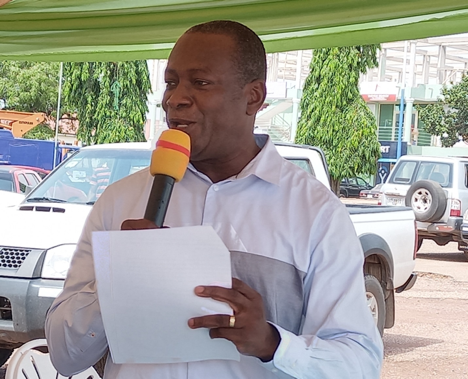The Ministry of Food and Agriculture (MoFA) has decided to implement more digital agricultural innovations to give more meaning to government’s agricultural transformation agenda, aimed at ensuring sustainable and resilient food production systems in the country.
This, according to the ministry, has become particularly more imperative with the significant negative impact of COVID-19 on food production and supply systems across the globe.
The National Coordinator, Directorate of Agricultural Extension Services-MoFA, Emmanuel Agyei Odame made this known while speaking during the opening session of a two-day agricultural technologies dissemination fair held in Sunyani. The fair was jointly organized by MoFA and Council for Scientific and Industrial Research (CSIR), and was attended by actors across the entire spectrum of agricultural technology. It was under the theme ‘Promoting agribusiness and market linkages in the COVID-19 era: The impact of technology development and dissemination’.
Mr. Emmanuel Agyei Odame mentioned that as an import-driven economy, the persistence of COVID-19 and its associated restrictions such as closure of borders, have adverse effects on the country’s reserves – hence the need for a paradigm-shift to neutralise the imminent effects. He, therefore, advised farmers and other actors in the agricultural value chain to brace themselves for digital agriculture and other related activities to develop a robust system to withstand the shocks.
“The lessons of COVID-19 have created a new sense of awareness about building strong food systems that will ensure resilience and reduce dependence on food imports. The country’s ability to respond to the challenges have undoubtedly given credence to government’s flagship programmes in agriculture – for example Planting for Food and Jobs; Planting for Export and Rural Development; Rearing for Food and Jobs; and Greenhouse system”.
The Agric Ministry, he indicated, has already hit the ground running with its dissemination of improved agricultural technologies to farmers and others actors along the value chain through radio, TV, smart phones among others; adding that the technology dissemination programme has impacted positively, thus creating a common platform for farmers, processors, input dealers, researchers and other policymakers to interact.
Prof. Joe Manu-Aduening, Principal Research Scientist/Technical Specialist-CSIR, stated that a number of improved planting materials and technologies have over the years been developed to boost production and productivity, but some of them are still elusive to farmers. He urged Agricultural Extension Agents (AEAs) to step up their efforts to help farmers adopt the improved seeds and technologies, adding that farmers can only improve their productivity and incomes if they are abreast with modern technologies and planting materials.
The two-day agricultural technologies dissemination fair was in line with the implementation of Modernizing Agriculture in Ghana (MAG), a five-year programme sponsored by the Canadian government through Global Affairs Canada (GAC). MAG has four components which are: to provide support to increase the efficiency of local farmers through value chain development; support for specialized agricultural services to build national market linkages and promote efficiencies in commodity development along value chains; support for agricultural research to strengthen extension services and improve agricultural productivity; and to develop the enabling environment needed to improve agricultural productivity and competitiveness.























